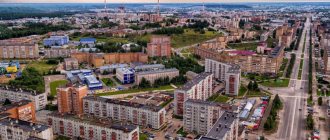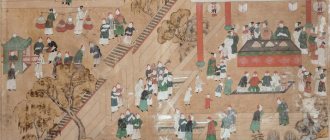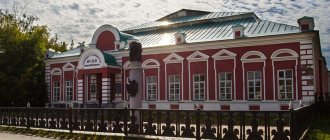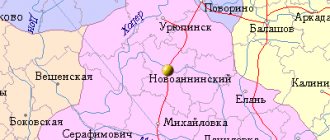We love
(Yaroslavl region)
OKATO code:
78218501
Founded:
1546
City since:
1546 City of district subordination (Lyubimsky district, Yaroslavl region)
Center:
Lyubimsky district
Telephone code (reference phone)
| 48543***** | — |
Deviation from Moscow time, hours:
0
Geographic latitude:
58°21′
Geographic longitude:
40°42′
Altitude above sea level, meters:
105 Sunrise and sunset times in the city of Lyubim
Industry
The city's main enterprises are small. The main ones are:
- LLC "Agrobusiness" (former collective farm "Vpered" + cheese and butter making
- OJSC "Lubimkhleb"
- OJSC Lyubimskaya Agricultural Equipment
- as well as a sewing workshop
Utility providers:
- Power supply - JSC Yaroslavl Power Supply Company, maintenance - JSC Yaroslavl Electric Grid Company
- Heat supply - Lyubimsky Municipal Unitary Enterprise Housing and Communal Services (3 heating gas boiler houses)
- Water supply - Lyubimsky Municipal Unitary Enterprise Housing and Communal Services (source of water consumption - the Ucha River, station capacity - 600 m3/day), some enterprises have their own wells
- Water disposal - Lyubimsky municipal unitary enterprise housing and communal services (wastewater volume - 500 m3/day), some enterprises are not connected to the city sewerage system
Map
| We love: cards |
We love: photos from space (Google Maps) We love: photos from space (Microsoft Virtual Earth)
| We love you. Nearest cities. Distances in km. on the map (in brackets along roads) + direction. Using the hyperlink in the distance , you can get the route (information courtesy of the AutoTransInfo website) | |||
| 1 | Most Pure | 22 (25) | Z |
| 2 | Danilov | 35 (39) | SW |
| 3 | Buoy | 50 (60) | IN |
| 4 | Vokhtoga (Vologda region) | 54 (128) | WITH |
| 5 | Susanino (Kostroma region) | 56 (97) | SE |
| 6 | Nikolskoye (Kostroma region) | 64 () | YU |
| 7 | Gryazovets | 64 (74) | NW |
| 8 | Kostroma | 66 (158) | YU |
| 9 | Karavaevo (Kostroma region) | 71 () | YU |
| 10 | Nekrasovskoe | 77 (155) | YU |
| 11 | Sudislavl (Kostroma region) | 79 (194) | SE |
| 12 | Tutaev | 85 (146) | SW |
| 13 | Konstantinovsky | 87 () | SW |
| 14 | Yaroslavl | 93 (106) | SW |
| 15 | Poshekhonye | 93 (121) | Z |
| 16 | Galich | 96 (122) | IN |
| 17 | Krasnoe-on-Volga (Kostroma region) | 98 (193) | YU |
| 18 | Nerekhta | 100 (199) | YU |
| 19 | Volgorechensk | 105 (201) | YU |
| 20 | Vologda | 106 (122) | NW |
| 21 | Ostrovskoye (Kostroma region) | 109 (227) | SE |
| 22 | Plyos | 110 (229) | SE |
| 23 | Privolzhsk | 112 (211) | YU |
| 24 | Rybinsk | 114 (187) | Z |
| 25 | Shuiskoye (Vologda region) | 115 (216) | WITH |
| 26 | Dairy (Vologda region) | 119 (137) | NW |
a brief description of
Located at the confluence of the river. Studying in the district Obnora (tributary of the Kostroma), 123 km northeast of Yaroslavl. Railway station.
Territory (sq. km): 86
Information about the city of Lyubim on the Russian Wikipedia site
Historical sketch
Founded in 1546, in the 16th century. The city was called Lyubim. The name is from the Russian personal name Lyubim, very common in the 15th and 16th centuries.
Since 1708, the city of the Moscow province, since 1719 - in the Kostroma province of the Moscow province. Since 1777, the district town of Lyubim of the Yaroslavl governorship (since 1796 - Yaroslavl province).
In 1856, in the district town of Lyubim, Yaroslavl province, there were 7 churches, 334 houses, 76 shops.
Since the 1920s the village of Lyubim, from April 20, 1938 again the city of Lyubim.
Economy
Forestry and local industry enterprises, meat processing plant.
Culture, science, education
The poet L.N. was born in Lyubim. Trefolev, author of the famous song “Kamarinskaya”.
Museums, galleries, exhibition halls
Lyubimsky Museum of History and Local Lore 152470, Yaroslavl region, Lyubimsky district, Lyubim, st. Oktyabrskaya, 11 Phone(s): (48543) 23-370 Website: https://lubim-muzey.ru/
| Population by year (thousands of inhabitants) | |||||||
| 1856 | 2.2 | 1989 | 7.1 | 2006 | 6.0 | 2015 | 5.2 |
| 1897 | 3.0 | 1992 | 6.9 | 2007 | 5.9 | 2016 | 5.1 |
| 1913 | 3.3 | 1996 | 6.7 | 2008 | 5.8 | 2017 | 5.1 |
| 1926 | 3.7 | 1998 | 6.5 | 2010 | 5.6 | 2018 | 5.1 |
| 1939 | 7.1 | 2000 | 6.4 | 2011 | 5.6 | 2019 | 5.1 |
| 1959 | 7.6 | 2001 | 6.4 | 2012 | 5.3 | 2020 | 5.0 |
| 1970 | 7.7 | 2003 | 6.3 | 2013 | 5.3 | 2021 | 5.0 |
| 1979 | 7.4 | 2005 | 6.0 | 2014 | 5.2 | ||
City coat of arms
The coat of arms of Lyubim was Supremely approved on August 31 (September 11), 1778 by Empress Catherine II, along with other coats of arms of the cities of the Yaroslavl governorship (PSZ, 1778, Law No. 14765)[4][5] Law No. 14765 in the Complete Collection of Laws of the Russian Empire is dated June 20 1778, but on the drawings of coats of arms attached to it, the date of approval of the coats of arms is indicated - August 31, 1778. The official description of the coat of arms is as follows: “The shield is divided in half: from a green field, divided into several parts by black, a bear emerges, in a silver field, proving that this city belongs to the Yaroslavl governorship.” The coat of arms of Lyubim was composed by the comrade of the king of arms, collegiate adviser I. I. von Enden. In 1863, during the period of the heraldic reform of Köhne, a draft of a new coat of arms for the county town of Lyubim, Yaroslavl province was developed (not officially approved): “In a silver shield there is a green battlement with silver seams. In the free part is the coat of arms of the Yaroslavl province. The shield is crowned with a silver wall crown and surrounded by golden ears of corn, connected by an Alexander ribbon.”
In Soviet and post-Soviet times, no decision was made to restore the historical coat of arms of Lyubim (or create a new one) as the official symbol of the city. The coat of arms of Lyubim is not included in the State Heraldic Register.
Mysteries of the city of Lyubim
In the northeast of the Yaroslavl region, at the confluence of the Ucha and Obnora rivers, there is a town with an unusual name - Lyubim.
Now you can’t call it a backwater, as historians and local historians used to write about it. On the contrary, it grows and develops, maintaining its originality, each year presenting local historians with more and more mysteries. On the western outskirts of Lyubim, at the end of Trinity Street, there are three churches built at approximately the same time: Trinity, Kazanskaya and Tikhvinskaya. At first glance, it seems that there was once a monastery, a fortress or other defensive fortification here, but there is no factual evidence of this yet, although the churches were once surrounded by a stone fence, and their names are characteristic. The oldest of them is called Trinity, which is on the moat, and the bell tower at the northwestern corner, the Tikhvin Church, is the gate tower.
According to preliminary information, the Tikhvin Church was built in 1786, but some elements in its architecture indicate that this is an earlier building that has come down to us in a distorted form.
It seems that at a later time a high quadrangle with a strongly extended apse and windows decorated in the traditions of the “Moscow Baroque” was added to the old gate church. Differences in style are immediately visible: the window frames of early and late buildings are different, and the decorative design of the windows is also different. If in an early building we see kokoshniks above the windows, then in a later building the windows end with torn pediments with keystones. In addition, the eastern part of the early building is slightly higher than the altar apse of the later one and has a semicircular structure in plan.
Unfortunately, the western part of the old church was lost: instead, in the second half of the 19th century, a two-story gallery with semi-circular windows and triangular pediments was added on both facades. Therefore, in order to understand what the Tikhvin Church actually looked like and whether it was a gatehouse, serious architectural and restoration research is needed. Not everything is clear with the Trinity Church: it was built in 1739, but some researchers suggest that construction took place at the turn of the 17th–18th centuries. This is indicated, for example, by the large brick used for construction in the 17th century - it was found next to the church.
Riddle three: the treasury building Another attraction of Lyubim is the building of the former county treasury. It was previously believed that this house was built in the first third of the 19th century and belonged to the merchant Lobanov, but when opening the plaster on the facades of the building, architectural elements of early classicism of the 1780s were revealed. Architects-restorers from Yaroslavl Vyacheslav Safronov and Dmitry Kshukin found out that this building housed the county treasury, and on its first and second floors there were rooms clearly intended for storing the treasury. During the restoration work, when opening the plaster, on the facades of the house between the windows of the first and second floors and under the windows of the first, filled niches were discovered, and when laying pits in the base of the building, chipped bases of pilasters of the late 18th century were revealed. After opening the niches, it was confirmed that the house was indeed older than previously thought. Now it has been partially restored, put in order and is now considered the most beautiful in the city by the residents of Lyubim. Youth
Source
Russian Orthodox Church
Previously, there were five active churches in the city, now there are only two[3]. Churches and chapels:
- Kazan Church (1739) - active
- Tikhvin Church (1786) - active
- Trinity Church (1739) - inactive
- Epiphany Cathedral (1798) - being restored
- Church of the Exaltation of the Cross (1812-1825) - inactive
- Church of the Nativity of John the Baptist (1769) - active
- Presentation of the Blessed Virgin Mary into the Temple (1786) - current
- Chapel of Alexander Nevsky (1888) - active
Excerpt characterizing Love
- Which one? - Drubetsky? - No, recently... - What do you like about him? - Yes, he is a nice young man... Why are you asking me this? - said Princess Marya, continuing to think about her morning conversation with her father. “Because I made an observation, a young man usually comes from St. Petersburg to Moscow on vacation only for the purpose of marrying a rich bride. – You made this observation! - said Princess Marya. “Yes,” Pierre continued with a smile, “and this young man now behaves in such a way that where there are rich brides, there he is.” It’s like I’m reading it from a book. He is now undecided who to attack: you or mademoiselle Julie Karagin. Il est tres assidu aupres d'elle. [He is very attentive to her.] - Does he go to see them? - Very often. And do you know a new style of grooming? - Pierre said with a cheerful smile, apparently in that cheerful spirit of good-natured ridicule, for which he so often reproached himself in his diary. “No,” said Princess Marya. - Now, in order to please Moscow girls - il faut etre melancolique. Et il est tres melancolique aupres de m lle Karagin, [one must be melancholic. And he is very melancholy with m elle Karagin,” said Pierre. - Vraiment? [Really?] - said Princess Marya, looking into Pierre’s kind face and never ceasing to think about her grief. “It would be easier for me,” she thought, if I decided to trust someone with everything I feel. And I would like to tell Pierre everything. He is so kind and noble. It would make me feel better. He would give me advice!” – Would you marry him? asked Pierre. “Oh, my God, Count, there are moments when I would marry anyone,” Princess Marya suddenly said to herself, with tears in her voice. “Oh, how hard it can be to love a loved one and feel that... nothing (she continued in a trembling voice) you can’t do for him except grief, when you know that you can’t change it.” Then one thing is to leave, but where should I go?... - What are you, what’s wrong with you, princess? But the princess, without finishing, began to cry. – I don’t know what’s wrong with me today. Don't listen to me, forget what I told you. All Pierre's gaiety disappeared. He anxiously questioned the princess, asked her to express everything, to confide in him her grief; but she only repeated that she asked him to forget what she said, that she did not remember what she said, and that she had no grief other than the one he knew - the grief that Prince Andrei’s marriage threatens to quarrel with his father son. – Have you heard about the Rostovs? – she asked to change the conversation. - I was told that they would be here soon. I also wait for Andre every day. I would like them to see each other here. – How does he look at this matter now? - Pierre asked, by which he meant the old prince. Princess Marya shook her head. - But what to do? There are only a few months left until the year ends. And this cannot be. I would only like to spare my brother the first minutes. I wish they would come sooner. I hope to get along with her. “You have known them for a long time,” said Princess Marya, “tell me, hand on heart, the whole true truth, what kind of girl is this and how do you find her?” But the whole truth; because, you understand, Andrei risks so much, doing this against the will of his father, that I would like to know... A vague instinct told Pierre that in these reservations and repeated requests to tell the whole truth, Princess Marya’s ill will towards her future daughter-in-law was expressed, that she I wanted Pierre not to approve of Prince Andrei’s choice; but Pierre said what he felt rather than thought. “I don’t know how to answer your question,” he said, blushing, without knowing why. “I absolutely don’t know what kind of girl this is; I can't analyze it at all. She's charming. Why, I don’t know: that’s all that can be said about her. “Princess Marya sighed and the expression on her face said: “Yes, I expected and was afraid of this.” – Is she smart? - asked Princess Marya. Pierre thought about it. “I think not,” he said, “but yes.” She doesn't deserve to be smart... No, she's charming, and nothing more. – Princess Marya again shook her head disapprovingly. - Oh, I so want to love her! You will tell her this if you see her before me. “I heard that they will be there one of these days,” said Pierre. Princess Marya told Pierre her plan about how, as soon as the Rostovs arrived, she would become close to her future daughter-in-law and try to accustom the old prince to her. Boris did not succeed in marrying a rich bride in St. Petersburg and he came to Moscow for the same purpose. In Moscow, Boris was indecisive between the two richest brides - Julie and Princess Marya. Although Princess Marya, despite her ugliness, seemed more attractive to him than Julie, for some reason he felt awkward courting Bolkonskaya. On her last meeting with her, on the old prince’s name day, to all his attempts to talk to her about feelings, she answered him inappropriately and obviously did not listen to him. Julie, on the contrary, although in a special way peculiar to her, willingly accepted his courtship. Julie was 27 years old. After the death of her brothers, she became very rich. She was now completely ugly; but I thought that she was not only just as good, but even much more attractive than she was before. She was supported in this delusion by the fact that, firstly, she became a very rich bride, and secondly, that the older she became, the safer she was for men, the freer it was for men to treat her and, without taking on any obligations, take advantage of her dinners, evenings and the lively company that gathered at her place. A man who ten years ago would have been afraid to go every day to the house where there was a 17-year-old young lady, so as not to compromise her and tie himself down, now went to her boldly every day and treated her not as a young bride, but as a acquaintance who has no gender. The Karagins' house was the most pleasant and hospitable house in Moscow that winter. In addition to parties and dinners, every day a large company gathered at the Karagins, especially men, who dined at 12 o'clock in the morning and stayed until 3 o'clock. There was no ball, party, or theater that Julie missed. Her toilets were always the most fashionable. But, despite this, Julie seemed disappointed in everything, told everyone that she did not believe in friendship, nor in love, nor in any joys of life, and expected peace only there. She adopted the tone of a girl who had suffered great disappointment, a girl as if she had lost a loved one or had been cruelly deceived by him. Although nothing of the sort happened to her, they looked at her as if she were one, and she herself even believed that she had suffered a lot in life. This melancholy, which did not prevent her from having fun, did not prevent the young people who visited her from having a pleasant time. Each guest, coming to them, paid his debt to the melancholy mood of the hostess and then engaged in small talk, dancing, mental games, and Burime tournaments, which were in fashion with the Karagins. Only some young people, including Boris, delved deeper into Julie’s melancholic mood, and with these young people she had longer and more private conversations about the vanity of everything worldly, and to them she opened her albums covered with sad images, sayings and poems. Julie was especially affectionate towards Boris: she regretted his early disappointment in life, offered him those consolations of friendship that she could offer, having suffered so much in life herself, and opened her album to him. Boris drew two trees in her album and wrote: Arbres rustiques, vos sombres rameaux secouent sur moi les tenebres et la melancolie. [Rural trees, your dark branches shake off darkness and melancholy on me.] Elsewhere he drew a tomb and wrote: “La mort est secourable et la mort est tranquille “Ah! contre les douleurs il n'y a pas d'autre asile.” [Death is salutary and death is calm; ABOUT! there is no other refuge against suffering.] Julie said it was lovely. “II ya quelque chose de si ravissant dans le sourire de la melancolie, [There is something infinitely charming in the smile of melancholy," she said to Boris word for word, copying this passage from the book. – C'est un rayon de lumiere dans l'ombre, une nuance entre la douleur et le desespoir, qui montre la consolation possible. [This is a ray of light in the shadows, a shade between sadness and despair, which indicates the possibility of consolation.] - To this Boris wrote her poems: “Aliment de poison d'une ame trop sensible, “Toi, sans qui le bonheur me serait impossible, "Tendre melancolie, ah, viens me consoler, "Viens calmer les tourments de ma sombre retraite "Et mele une douceur secrete "A ces pleurs, que je sens couler." [Poisonous food of an overly sensitive soul, You, without whom happiness would be impossible for me, Tender melancholy, oh, come, comfort me, Come, soothe the pangs of my gloomy solitude, And add a secret sweetness To these tears that I feel flowing.] Julie played the saddest nocturnes on the harp for Boris. Boris read Poor Liza aloud to her and more than once interrupted his reading from the excitement that took his breath away. Meeting in a large society, Julie and Boris looked at each other as the only indifferent people in the world who understood each other. Anna Mikhailovna, who often went to the Karagins, making up her mother’s party, meanwhile made correct inquiries about what was given for Julie (both Penza estates and Nizhny Novgorod forests were given). Anna Mikhailovna, with devotion to the will of Providence and tenderness, looked at the refined sadness that connected her son with the rich Julie. “Toujours charmante et melancolique, cette chere Julieie,” she said to her daughter. - Boris says that he rests his soul in your house. “He has suffered so many disappointments and is so sensitive,” she told her mother. “Oh, my friend, how attached I have become to Julie lately,” she said to her son, “I can’t describe to you!” And who can not love her? This is such an unearthly creature! Ah, Boris, Boris! “She fell silent for a minute. “And how I feel sorry for her maman,” she continued, “today she showed me reports and letters from Penza (they have a huge estate) and she is poor, all alone: she is so deceived! Boris smiled slightly as he listened to his mother. He meekly laughed at her simple-minded cunning, but listened and sometimes asked her carefully about the Penza and Nizhny Novgorod estates. Julie had long been expecting a proposal from her melancholic admirer and was ready to accept it; but some secret feeling of disgust for her, for her passionate desire to get married, for her unnaturalness, and a feeling of horror at renouncing the possibility of true love still stopped Boris. His vacation was already over. He spent whole days and every single day with the Karagins, and every day, reasoning with himself, Boris told himself that he would propose tomorrow. But in the presence of Julie, looking at her red face and chin, almost always covered with powder, at her moist eyes and at the expression of her face, which always expressed a readiness to immediately move from melancholy to the unnatural delight of marital happiness, Boris could not utter a decisive word: despite the fact that for a long time in his imagination he considered himself the owner of Penza and Nizhny Novgorod estates and distributed the use of income from them. Julie saw Boris's indecisiveness and sometimes the thought occurred to her that she was disgusting to him; but immediately the woman’s self-delusion came to her as a consolation, and she told herself that he was shy only out of love. Her melancholy, however, began to turn into irritability, and not long before Boris left, she undertook a decisive plan. At the same time that Boris's vacation was ending, Anatol Kuragin appeared in Moscow and, of course, in the Karagins' living room, and Julie, unexpectedly leaving her melancholy, became very cheerful and attentive to Kuragin.
Famous people
Heroes of the Soviet Union
- Dyshinsky, Vladimir Aleksandrovich (1923-1944) - lieutenant of the Red Army.
- Ivanov, Nikolai Pavlovich (1908-1943) - Major of the Red Army.
- Smirnov Vladimir Vasilievich (1902-1943) - colonel, commander of an air regiment.
- Subbotin, Serafim Pavlovich (1921-1996) - fighter pilot of the USSR Air Force.
Natives
- Zhadovskaya, Yulia Valerianovna (1824-1883) - poetess.
- Voronin, Sergei Alekseevich (1913-2002) - writer, prose writer.
- Kuznetsov, Mikhail Pavlovich (born 1941) - chess composer.
- Romanov, Boris Leonidovich (born 1942) - People's Artist of Russia.
- Trefolev, Leonid Nikolaevich (1839-1905) - poet, publicist. Author of lyrics to the songs “When I served as a coachman at the post office”, “Komarinsky peasant” and others.
Others
In 1560, during the capture of the Fellin fortress, the landmaster of the Teutonic Order in Livonia, Johann Wilhelm von Furstenberg, was captured by order of Ivan the Terrible, he was exiled to Lyubim[3], where he may have died no earlier than 1568.
For some time, the Hungarian Rudolf Garashin lived in Lyubim, who was captured here as a prisoner of war in the First World War; here he joined the Communist Party. During the Great Patriotic War he was chief of staff of the regiment. After the liberation of his homeland, he returned to Hungary, where he served as Minister of Internal Affairs and Ambassador to China and Korea. In 1967, shortly before his death, he came to Lyubim[3].
Transport
Cargo and passenger transportation is carried out by rail and road transport. The Lyubim railway station belongs to the Buysky branch of the Northern Railway.
Three paved intermunicipal roads approach the city:
- We love - Bui
- We love - Most Pure
- We love - Yaroslavl
The bus station is located on Lenin Street, in the city center.
- 1. Lyubim bus station - Polevaya street - Bus station - Otradny - Bus station - Substation - Lyubim bus station;
- 4. We love - Filippovo - turn to Ponizovki - Bulakovo - We love
- 5. We love - Filippov - Karganovo - We love
- 109. We love - Filippovo - Obnorskoe - We love
- 118. We love - Quintanovo
- 213d. We love - Dorskoe - Voskresenskoe - We love
- 213d. We love – Romantsevo – Maslovo
- 263. We love - Filippovo - turn to Ponizovki - We love
- 370. We love - Filippovo - Sloboda - We love
- 487. We love - Pokrov
- 490. We love - Tyurikovo - Trinity - We love
- 520. We love - Sereda - Yaroslavl
- 520ke. We love – Regional hospital – KDP “Zavolzhye”
- 522. We love - Danilov - Yaroslavl
Love (Lyubim)
We love
- the smallest city in the Yaroslavl region and one of the smallest in Russia, the administrative center of the municipal district.
Located at the confluence of the Ucha and Obnora rivers. The nearest cities are Danilov (38 km) and Bui, Kostroma region (60 km). The city's population is just over 5,000 people.
Lyubim's story
The first mention of the city dates back to the time of Ivan the Terrible. According to legend, he loved to hunt in local forests rich in game and ordered the founding of a fortress here that would protect local residents from the attacks of the Kazan Tatars.
According to the main version, the city got its name thanks to the male name Lyubim, which was very common in Rus' in the 16th century.
The reform of the government of Elena Glinskaya, the purpose of which was to strengthen trade and the country's defense capability, made Lyubim one of the hundred most significant cities in Russia. Gradually the city developed into an important center of domestic trade.
In 1777, Lyubim was granted city status, although at that time there were no pavements or street lighting. The main occupations of the residents were agriculture, logging and cheese making. Less than a year later, the city's coat of arms was approved.
By the beginning of the 19th century, there were only six stone houses in Lyubim, the population was about 2,000 people.
Active population growth was observed in the second half of the 20th century, but at the moment this figure is steadily declining. The city has agricultural enterprises, a butter and cheese factory, a bakery and a timber processing plant.
Attractions Lyubim
Lyubim is a small provincial town, which makes it interesting. The central part of the city has a radial-ring development, which was typical for medieval Russian cities.









